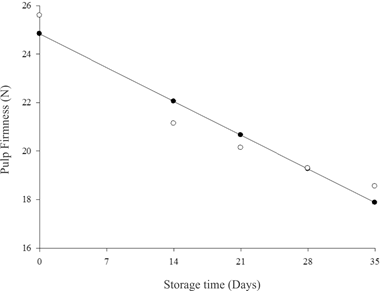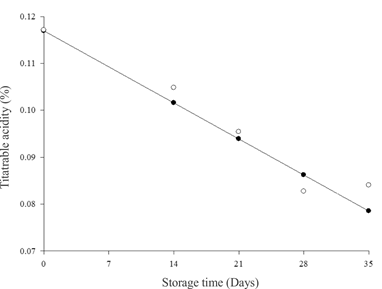ABSTRACT
Maintaining cantaloupe melon at field temperature impairs conservation as it speeds up cell metabolism and transpiration, and, consequently, reduces shelf life. This study aimed to evaluate the conservation of Torreon hybrid cantaloupe using the hydrocooling treatment. Fruits were harvested at the commercial maturity stage (60 days after planting), in the morning, at the Nova California Farm, municipality of Mossoró-RN, in September 2007. One set of fruit was immersed in chilled water at 5 ºC for 5 min, at the packing house, while the remaining set was not hydro cooled. Then, both sets (treated and untreated with hydrocooling) were pre-cooled in air forced tunnels at 7 ºC, until the temperature in the pulp reached 10 ºC. Both fruit sets were stored for 0, 14, 21, 28 and 35 days under modified atmosphere at 3 ± 1 oC and 90 ± 5% RH. After each storage period, the fruits were incubated in an atmosphere-controlled chamber at 20 ± 2 oC and 80 ± 5% de RH, for seven days. The following characteristics were evaluated: external and internal appearance, mass loss, soluble solids, firmness and titrable acidity. The experiment was arranged in a completely randomized split-plot design with four replications of three fruits. The plots consisted of the hydrocooling conditions (with and without fruit soaking in chilled water), and the sub-plots consisted of the storage times (0, 14, 21, 28 and 35 days).The treatment with hydrocooling was efficient in keeping the firmness and soluble solids of the fruits and shortened the pre-cooling time in the cooling tunnel. However, hydrocooling did not increase fruit shelf-life.
Key words:
Cucumis melo L.; Storage; Quality

 Thumbnail
Thumbnail
 Thumbnail
Thumbnail
 Thumbnail
Thumbnail
 Thumbnail
Thumbnail
 Thumbnail
Thumbnail





